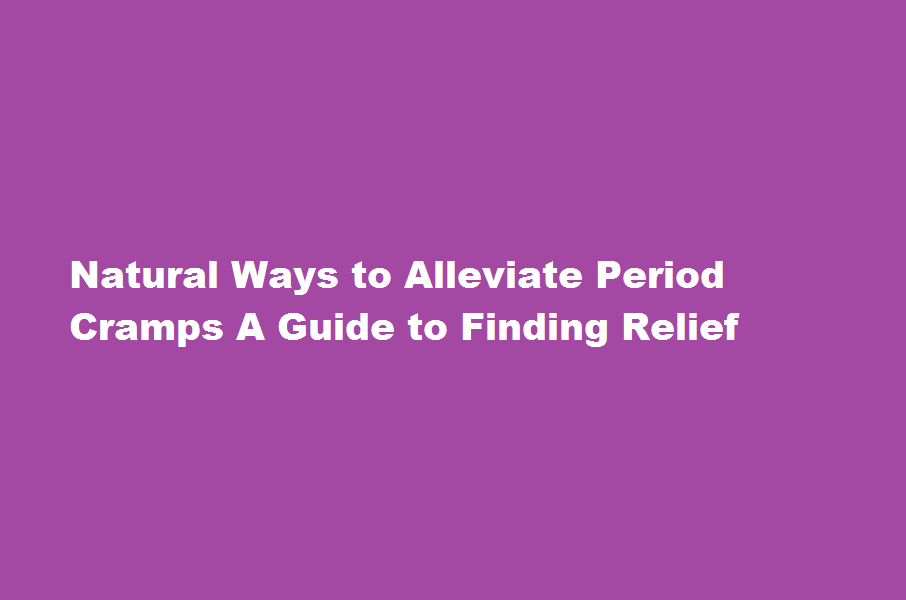Natural Ways to Alleviate Period Cramps A Guide to Finding Relief
3 min read
Introduction
Period cramps, medically known as dysmenorrhea, affect millions of women worldwide. The discomfort and pain experienced during menstruation can disrupt daily activities and negatively impact quality of life. While over-the-counter pain relievers can offer temporary relief, many individuals seek natural remedies to manage period cramps. This article explores various effective techniques and lifestyle changes that can help alleviate menstrual cramps, providing a holistic approach to finding relief.
Heat Therapy
Applying heat to the lower abdomen is a simple yet effective method to reduce period cramps. Heat helps relax the uterine muscles and increase blood flow, providing relief from pain. Use a heating pad or take a warm bath to soothe the area. Additionally, herbal heat packs or hot water bottles wrapped in a towel can be applied for 15-20 minutes at a time. Incorporating heat therapy into your routine during menstruation can significantly alleviate cramps and promote relaxation.
Exercise and Stretching
Engaging in regular physical activity and incorporating specific exercises and stretches into your routine can help reduce the severity of period cramps. Moderate-intensity exercises, such as walking, swimming, or cycling, release endorphins that act as natural painkillers. Gentle yoga poses like Child’s Pose, Cobra Pose, and Supine Twist can help relax the abdominal muscles and relieve tension. Additionally, aerobic exercises can improve blood circulation, reducing cramp severity. It is important to listen to your body and choose activities that feel comfortable and manageable during menstruation.
Dietary Adjustment
Making mindful dietary changes can positively impact menstrual cramps. Increasing your intake of anti-inflammatory foods, such as fatty fish (salmon, mackerel), nuts, seeds, and leafy green vegetables, can help reduce inflammation and alleviate pain. Additionally, consuming foods rich in calcium, magnesium, and vitamin D can minimise muscle contractions and cramp intensity. Include dairy products, dark chocolate, spinach, and fortified cereals in your diet. Reducing the intake of caffeine, alcohol, and processed foods can also be beneficial as they can exacerbate cramps. Staying adequately hydrated is essential for maintaining overall health and may help ease cramps. Experiment with different dietary adjustments to find what works best for your body.
Herbal Remedies
Several herbal remedies have been traditionally used to relieve menstrual cramps. Chamomile tea, known for its calming properties, can help relax the uterus and reduce pain. Ginger tea or capsules possess anti-inflammatory properties and can alleviate cramps. Raspberry leaf tea may help regulate menstrual cycles and reduce the severity of cramps. Additionally, essential oils such as lavender, clary sage, and marjoram can be diluted with carrier oils and gently massaged onto the lower abdomen for soothing effects. While these remedies are generally safe, it’s crucial to consult with a healthcare professional before trying any new herbal treatments, especially if you have underlying medical conditions or are taking medications.
Frequently asked question
What are the Drinks that help with period cramps?
Drinking chamomile, fennel or ginger tea is an easy, natural way to relieve menstrual cramps. Plus, these herbal teas can have other benefits, like stress relief and helping with insomnia.
Does chocolate help period cramps?
Dark chocolate may help ease menstrual cramps due to its high magnesium content.
Conclusion
Period cramps can significantly impact a woman’s well-being, but there are natural approaches to finding relief. Incorporating heat therapy, exercise and stretching, dietary adjustments, and herbal remedies can help alleviate menstrual cramps. It is essential to listen to your body, experiment with different techniques, and consult with a healthcare professional for personalized guidance. By taking a holistic approach, you can find effective strategies to manage and minimize period cramps, promoting a better quality of life during menstruation.
Read Also : Finding Relief Tips for Easing Period Discomfort






